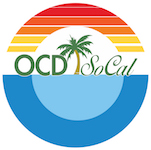
What is advocacy? It is defined as ‘public support for or recommendation of a particular cause or policy.’ Many individuals in the OCD community believe that to be an advocate, they have to publicly share their story about OCD on a large forum, including opening up about personal details.
However, OCD Awareness Week is designed to allow EVERYONE to become an advocate. The goal of OCD Awareness Week is to get the word out about what OCD really is. Not the ‘I like to organize my sock drawer by color’ OCD that makes it seem like a funny and quirky habit that the public may know. But instead, educating them on the REAL OCD: ‘constant and torturous taboo and intrusive thoughts that force individuals to engage in time-consuming and laborious physical and mental compulsions.’
So how do we get the general public to properly understand OCD? More than that, how do we ensure that doctors and other medical and mental health staff properly diagnose OCD? Or that insurance companies compensate for OCD treatment, laws protect those with mental disorders, and money is raised for OCD research? That answer is to get out the message of what OCD truly is and why it deserves more attention.
That is where you come in.
Although OCD Awareness Week, a week dedicated to raising awareness of obsessive-compulsive disorder, has concluded, we must continue to educate the public on this debilitating disorder. The public includes your family, friends, and acquaintances! It is okay if you are not comfortable with publicly sharing your story on a national level–you can still advocate in the spirit of OCD Awareness Week by sharing with a parent, friend, sibling, classmate, co-worker, or your romantic partner about OCD. Tell them what OCD really is and how much it affects a person with the disorder. Make sure that you feel comfortable or safe sharing with this person. You can share as little or as much as you want about your story. Remember, you are not required to open up and share more than you are ready to. This will educate more and more people about OCD, and this helps spread awareness. If you are not comfortable sharing your personal story, you can educate them on what OCD is using general facts and statements without opening up that you have it.
As this year’s OCD Awareness Week concludes, the spirit of advocacy and awareness continues, and we hope that you will keep that alive! We look forward to (hopefully) having our OCD Awareness Week 2021 event in-person and until then, we are here to support you and those in your life affected by the disorder. Email us with any questions: Info@OCDSoCal.org.
Take care!
Chris Trondsen, M.S., AMFT, APCC
Vice President, OCD Southern California, an official affiliate of the IOCDF
